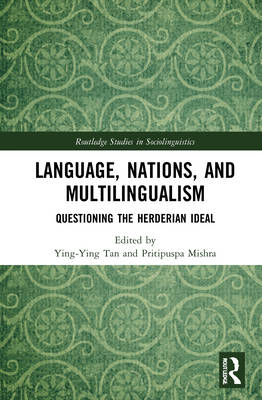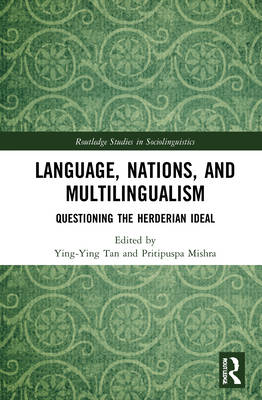
- Afhalen na 1 uur in een winkel met voorraad
- Gratis thuislevering in België vanaf € 30
- Ruim aanbod met 7 miljoen producten
- Afhalen na 1 uur in een winkel met voorraad
- Gratis thuislevering in België vanaf € 30
- Ruim aanbod met 7 miljoen producten
Language, Nations, and Multilingualism
Questioning the Herderian Ideal
Omschrijving
Language, Nations, and Multilingualism explores the legacy of Herder's ideas about the relationship between language and nationalism in the post-colonial world. Focusing on how anti-colonial and post-colonial nations reconcile their myriad multilingualisms with the Herderian model of one language-one nation, it shows how Herder's model is both attractive and problematic for such nations.
Why then does the Herderian model have such valency? How has the Herderian ideal of one nation-one language continued to survive beneath the uncomfortable resolution struck by new multilingual nations as they create fictions of a singular national mother tongue? To what extent is Herder still relevant in our contemporary world? How have different nations negotiated the Herderian ideal in different ways? What does the way in which multilingual post-colonial nations deal with this crisis tell us about a possible alternative framework for understanding the relationship between language and nation?
By approaching this investigation from diverse archives across Asia, Africa, Europe, Latin America, and the Caribbean, Language, Nations, and Multilingualism proposes answers to the aforementioned questions from a global perspective that takes into account the specificities of a range of colonial experiences and political regimes. And by extending the discussion backwards in time to offer a more historical reading of the making of modern nations, it allows us to see how multilingualism has always disrupted constructions of monoglot nations.
Specificaties
Betrokkenen
- Uitgeverij:
Inhoud
- Aantal bladzijden:
- 180
- Taal:
- Engels
- Reeks:
Eigenschappen
- Productcode (EAN):
- 9781138322639
- Verschijningsdatum:
- 31/12/2020
- Uitvoering:
- Hardcover
- Formaat:
- Genaaid
- Afmetingen:
- 155 mm x 239 mm
- Gewicht:
- 417 g

Alleen bij Standaard Boekhandel
Beoordelingen
We publiceren alleen reviews die voldoen aan de voorwaarden voor reviews. Bekijk onze voorwaarden voor reviews.










